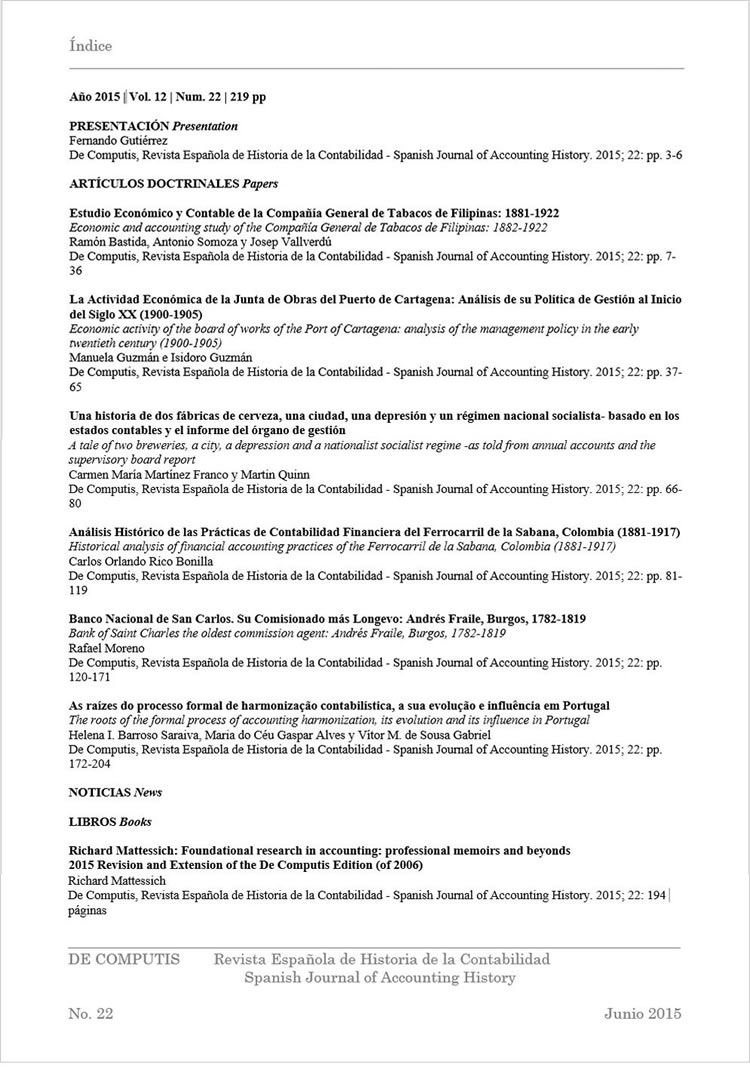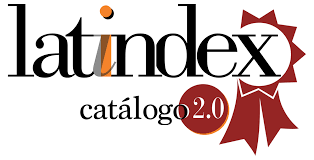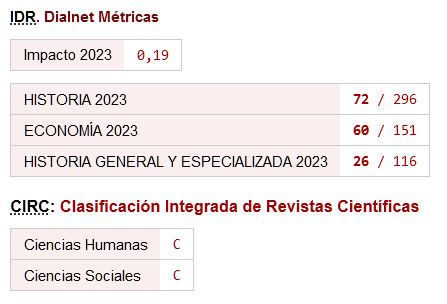Una historia de dos fábricas de cerveza, una ciudad, una depresión y un régimen nacional socialista- basado en los estados contables y el informe del órgano de gestión
DOI:
https://doi.org/10.26784/issn.1886-1881.v12i22.28Palabras clave:
Narración, Análisis de estados financieros, Consejo de Administración, Fábricas de cervezaResumen
Este trabajo presenta la narración de cómo un método de investigación es útil tanto en sí mismo como para el alcance de los proyectos de investigación. A partir de los datos de contabilidad de los archivos de dos fábricas de cerveza alemanas -Löwenbräu y Spaten - durante el periodo 1929-1939, se construye una historia en el complejo contexto existente en el momento para la gestión de las empresas. Para ello nos basamos en la información de los estados financieros y el informe del Consejo de Administración (Aufsichtsrat). El análisis revela razones interesantes relacionadas con el decreciente desempeño en general y a su vez, plantea varias cuestiones para futuras investigaciones en las dos fábricas de cerveza propuestas. Por lo tanto, podría decirse que, sin la construcción de la historia, tales cuestiones y áreas de interés potenciales no habrían sido identificadas. La metodología propuesta es útil para que los investigadores comprendan el alcance que pueden tener los proyectos de investigación a partir de datos contables a la vez que puede ser útil para establecer el contexto de los estudios de historia de la contabilidad y empresas.
Descargas
Citas
Armstrong, P. (2008). Calling out for more: comment on the future of interpretive accounting research. Critical Perspectives on Accounting, 19(8), 867-879. https://doi.org/10.1016/j.cpa.2007.02.010
Assél, A., & Huber, C. (2012). München und das Bier. Munich: Volk Verlag.
Avery, H. G. (1953). Accounting as a language. Accounting Review, 28(1), 83-87.
Belkaoui, A. (1978). Linguistic relativity in accounting. Accounting, Organizations and Society, 3(2), 97-104. https://doi.org/10.1016/0361-3682(78)90019-3
Bloomfield, R. J. (2008). Accounting as the language of business. Accounting Horizons, 22(4), 433- 436. https://doi.org/10.2308/acch.2008.22.4.433
Breton, G. (2009). From folk-tales to shareholder-tales: semiotics analysis of the annual report. Society and Business Review, 4(3), 187-201. https://doi.org/10.1108/17465680910994191
Bryman, A., & Bell, E. (2011). Business Research Methods. London: Oxford University Press.
Clarke, P. (2005). The story of Bernard F. Shields: the first professor of accountancy in the UK. Accounting History, 10(2), 103-123. https://doi.org/10.1177/103237320501000205
Czarniawska, B. (2004). Narratives in social science research. London: Sage. https://doi.org/10.4135/9781849209502
Damon, C. (2009). Constructing a narrative. In Potter, D. S. (Ed.), A companion to the Roman Empire (Vol. 32). London: John Wiley & Sons.
De Loo, I., Cooper, S., & Manochin, M. (2015). Enhancing the transparency of accounting research: the case of narrative analysis. Qualitative Research in Accounting and Management, 12(1), 34-54. https://doi.org/10.1108/QRAM-02-2013-0007
Evans, S. (2013). A thousand words? Accounting, Auditing & Accountability Journal, 26(4). https://doi.org/10.1108/aaaj.2013.05926daa.001
Fleischman, R. K., Mills, P. A., & Tyson, T. N. (1996). A theoretical primer for evaluating and conducting historical research in accounting. Accounting History, 1(1), 55-75.
https://doi.org/10.1177/103237329600100104
McAdams, D.P. (1993). The stories we live by: personal myths and the making of the self. New York: William C. Morrow and Co.
McKee, R. & Fryer, B. (2003). Storytelling that moves people. Harvard Business Review, 81(6), 51- 55.
McWatters, C. S., & Lemarchand, Y. (2013). Merchant networks and accounting discourse: the role of accounting transactions in network relations. Accounting History Review, 23(1), 49-83. https://doi.org/10.1080/21552851.2013.773632
McWatters, C. S., & Lemarchand, Y. (2010). Accounting as storytelling. Accounting, Auditing & Accountability Journal, 23(1), 14-54. https://doi.org/10.1108/09513571011010592
Hoffman, S., & Detzen, D. (2013). The regulation of asset valuation in Germany. Accounting History, 18(3), 367-389. https://doi.org/10.1177/1032373213492405
Jack, L. (2015). Future making in farm management accounting: The Australian "Blue Book". Accounting History, in press. https://doi.org/10.1177/1032373215579423
Lavoie, D. (1987). The accounting of interpretations and the interpretation of accounts: The communicative function of "the language of business". Accounting, Organizations and Society, 12(6), 579-604. https://doi.org/10.1016/0361-3682(87)90010-9
Lynd, S., Bahour, S. & Lynd, A. (Eds). 1994. Homeland: Oral Histories of Palestine and Palestinians. New York: Olive Branch Press.
Phillips, N. (1995) Telling organizational tales: On the role of narrative fiction in the study of organizations. Organization Studies, 16(4), 625-649. https://doi.org/10.1177/017084069501600408
Quinn, M. (2014) Stability and change in management accounting over time-A century or so of evidence from Guinness. Management Accounting Research, 25(1): 76-92. https://doi.org/10.1016/j.mar.2013.06.001
Schäder, C. (1999) Münchner Brauindustrie: 1871 1945 ; die wirtschaftsgeschichtliche Entwicklung eines Industriezweiges. Marburg: Tactum Verlag.
Spraakman, G. (2006). The impact of institutions on management accounting changes at the Hudson's Bay Company. Journal of Accounting and Organizational Change, 2(20), 101-122. https://doi.org/10.1108/18325910610675961
Vannini, A. (2009). Stories and Storytelling in Encyclopaedia of Communication Theory. Sage: Thousand Oaks, CA, 935-37.
Descargas
Publicado
Cómo citar
Número
Sección
Licencia

Esta obra está bajo una licencia internacional Creative Commons Atribución-NoComercial-CompartirIgual 4.0.










